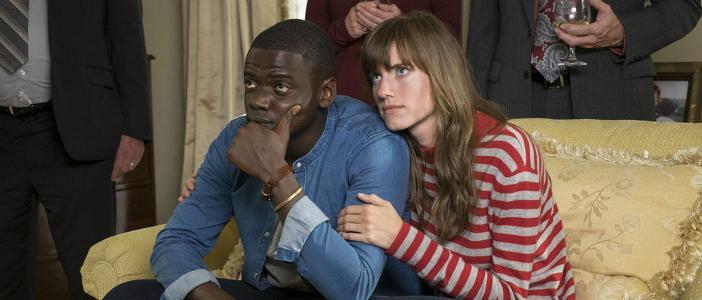Film Review | Get Out Highlights Shades of Racism That Are Both Seen and Unseen
The opening scene of Get Out shows a young black man lost while wandering the indistinct leafy streets of an affluent American suburb. He is trying to find his girlfriend’s house and feels visibly out of place. A white sports car drives past, gradually slowing down, only to make a U-turn and drive up beside him. “Not tonight,” he says turning around, before being attacked by the driver of the car and forced into the boot.
To anybody who has kept up with issues of race in America, such imagery will be laden with the memories of previous real-world incidents. The case of Trayvon Martin springs to mind in particular: the black teen was shot dead by a vigilante neighbourhood watch in 2012 while walking around a gated community in Florida.
Get Out tells the story of Chris (Daniel Kaluuya), a young photographer who meets his girlfriend Rose’s (Allison Williams) parents for the first time. Rose, who is white, has not told them that Chris is black. She assures him that they will love him, as her father would have “voted for Obama a third time.” Pretty soon after they arrive, Chris becomes wary of the subtle racism in his hosts and, at times, the plainly weird behaviour towards him. His uneasiness is tempered by Rose, but soon his fears develop into far more menacing realities.

The framework of Get Out mirrors horror and thriller genres in its suspenseful unravelling, but the pressing racial and social backdrop makes for an engaging twist to that formula. The premise is similar to the 1967 film Guess Who’s Coming to Dinner with Sidney Poitier. There, too, a supposedly liberal white family learns that their daughter is dating a black man. That movie came out three years after the signing of the Civil Rights Act, which banned racial discrimination.
Get Out similarly comes after two other milestones in the struggle for racial equality: the end of the final term for America’s first black president, and proliferation of incendiary political rhetoric. Both movies challenge the notion of racism as being something only the uneducated right-wing fringes must contend with: they show the subtle shades of racism that are enmeshed in everyday interactions.
Writer and director Jordan Peele is well accustomed to these nuances. His rise to fame came as one half of the sketch duo Key & Peele with Keegan-Michael Key. They frequently discuss racial identities and the code-switching between them.
[arve url=”https://www.youtube.com/watch?v=sRfnevzM9kQ” align=”center” maxwidth=”750"]
Peele skilfully transposes his comedic ideas onto the thriller genre. He infuses fun into a topic that is often difficult to discuss: Peele makes you laugh with discomfort at the ridiculousness of the everyday racism Chris endures. When talking about this on NPR’s Fresh Air, Peele said: “They’re one side of the same coin that ends up killing black men at the hands of police or the mass-incarceration of black people. Part of being black, or any minority in this country, is constantly being told that we’re being too aware of race, that we’re too obsessed with it. We’re constantly told we’re not seeing what we are seeing.”
And this neatly fits into the thriller genre: an evil threat grows while the characters dismiss it, or are told to do so, until it becomes impossible to ignore.
Nevertheless, Get Out’s true strength lies in its treatment of modern racism. Mass-incarceration, fetishising, brutalisation and general othering of African-Americans expose the stubborn divides in American society. The film instills shock through enjoyable hyperbolic horror, but the fears and discomfort at the heart of it are ever too real.
Get Out is in cinemas now.

